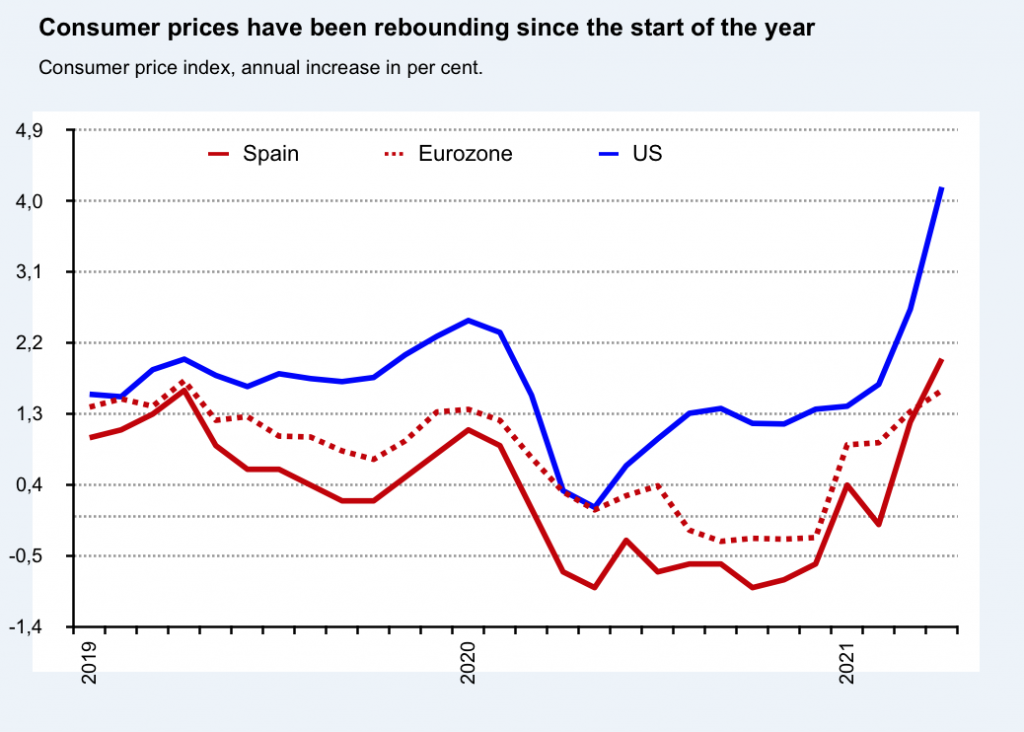Newsletter: The awakening of inflation
Tuesday, 25 may 2021
Good morning Future is blue readers,
This week we are talking about inflation. The advanced economies have experienced remarkably low levels of inflation over the last decades. Now things are changing, and policymakers and central bankers are keeping a close look at it on both sides of the Atlantic.
We’re also covering ideas on how to promote innovation in Europe. Agenda Pública analyst Miguel Laborda Pemán has written a piece on five lessons from the last millennium that Europe should consider making the most of the available funds to boost innovation.
See at the end what we are reading these days.
The awakening of inflation
After 3 decades of hibernation, inflation is back as a concerning factor in the advanced economies as the post pandemic world takes shape. This is particularly the case in the US where the consumer price index was above 4% in April.

On this side of the Atlantic the trend is more acute, yet the change of pattern is remarkable: in Spain,' the consumer price index was 2.2% in April, almost one more point compared to March. In Germany, traditionally a country that is so concerned about inflation, this index has reached 2%. Current forecasts suggest inflation could reach 3% in Europe in the next months, eroding households’ and businesses’ purchasing power. For the time being, however, core inflation (discounting volatile price components) seems to remain on a moderate path.
Looking forward, it will be key how central banks react to this trend. Indeed, the ongoing economic recovery rests crucially on monetary stimuli, which could be questioned if a genuine inflation process was put into motion. For now, the ECB seems to be not overly concerned, as businesses are mostly absorbing the shock. In the US, however, the scarcity of personnel in certain sectors together with the magnitude of the rebound and Biden’s multibillion package present a more concerning scenario.
For more on this you can access here my latest article in El País.
Promoting innovation in Europe: five lessons from the last millennium
“The 2020s will be depicted by would-be European chroniclers as a classic example of a critical juncture. In a context of growing geopolitical competition, Europe is witnessing its loss of innovative capacity vis-à-vis China and the US: it is our Sputnik moment”, claims Miguel Laborda Pemán.
Indeed, the post pandemic world presents an opportunity for the EU to promote innovation to the next level. There are funds available and there are plans to take advantage of those funds. Laborda takes a look at the last thousand years of innovation and “five centuries of global technological hegemony” in the history of Europe to draw some valuable lessons on how to make the most of this opportunity.
“If we pay attention to a powerful European ethical tradition, the only human obligation is to persist in what we already are. If we look at the last millennium, clues are clear: shall we start?”
Access here Miguel Laborda Pemán’s article: Promoting innovation in Europe: five lessons from the last millennium
What we are reading
Learning to live with debt
“Europe’s consensus on debt and inflation remains relatively hawkish, and assumes that the inflationary forces of the 1970s are still intact… Europe needs a new consensus that recognises the benefits of higher public debt, such as increased public investment and more safe assets to invest in…”.
The great Covid divergence: managing a sustainable and equitable recovery in the European Union
Worthy paper from Bruegel on perhaps the most relevant challenge today from a social perspective for policymakers: how to prevent lasting divergence within the EU and to prevent scarring from the fallout of the pandemic.
The boss is back but the workers are staying at home
As the labour market is slowly but steadily entering the post pandemic mode, it’s interesting to see up to what point telework will stay the norm. Good reading in the FT with insights on what’s happening in NY’s offices.
Jobs of the now. The top 10 jobs of the future have arrived early
More on the post pandemic way of working, interesting World Economic Forum article about the top jobs of the future.
Have a nice week!
Raymond Torres, Funcas Europe Director
